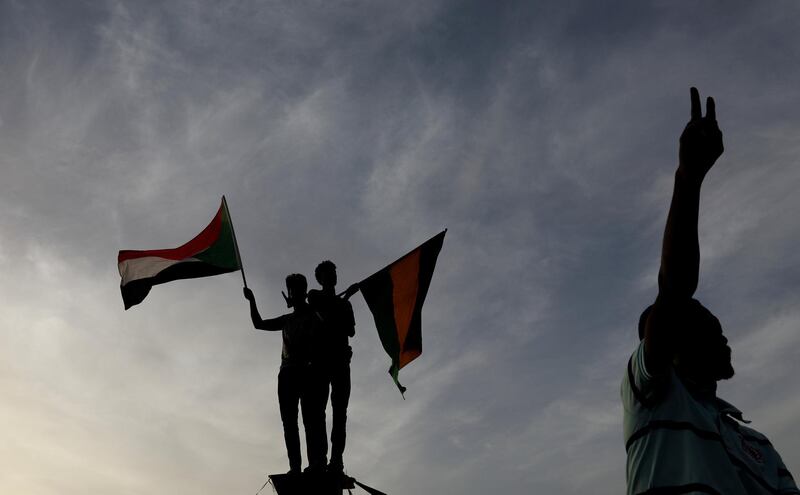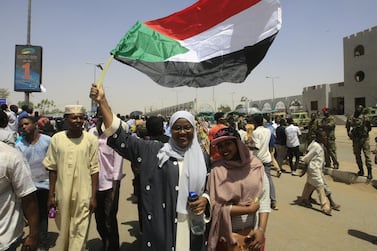Sudan’s ruling military council announced on Sunday that it would appoint a civilian prime minister and cabinet but not a president after the coup that removed longtime leader Omar Al Bashir.
Army spokesman Lt Gen Shamseldin Kibashi said the military had begun to overhaul security organisations and would not break up demonstrations that have continued outside the military headquarters since Thursday’s coup.
Sunday was the second day of meetings between the army and organisers of months of escalating street protests that led to Mr Al Bashir’s removal.
The announcement was unlikely to satisfy protesters, who have demanded full civilian rule.
Protest organisers have urged the military to “immediately and unconditionally” hand power to a transitional civilian government that would rule for four years.
The Sudanese Professionals Association, which has led the protests, posted a list of nine demands earlier on Sunday, including prosecution of those behind the military coup in 1989, dissolution of all pro-government unions, a freeze on the assets of top officials in Mr Al Bashir’s government and dismissal of all top judges and prosecutors.
There was no immediate comment from opposition figures about the military’s announcement.
After Saturday’s talks, Omar Al Degier, leader of the opposition Sudanese Congress Party, told protesters at a sit-in outside the military headquarters in Khartoum that the atmosphere had been “positive.”
Mr Al Degier said that the talks would focus on submitting the organisers’ demands and transition plan, and that they were calling for dissolving Mr Al Bashir’s ruling National Congress Party.
“We demanded restructuring the current security apparatus,” Mr Al Degier said. “We do not need a security apparatus that detains people and shuts off newspapers.”
The political parties and movements behind the four months of protests said in a joint statement late on Saturday that they would remain in the streets until their demands were met.
They said a handover to civilian rule would be the “first step towards the fall of the regime".
After the coup, the army appointed a military council that it says will rule for two years or less while elections are organised.
The military ended Mr Al Bashir’s nearly 30-year reign and placed him under house arrest in the capital.
Protesters fear that the military, which is dominated by his appointees, will cling to power or select one of its own to succeed him.
On Saturday, Saudi Arabia and the UAE issued statements in support of Sudan’s transitional military council.
Saudi Arabia said it “stands by the Sudanese people” and called on all Sudanese “to give priority to the national interest”.
The UAE urged Sudanese “to work towards protecting legitimacy and ensuring a peaceful transfer of power".
Saudi King Salman ordered an unspecified package of aid for Sudan that includes petroleum products, wheat and medicine.
Gen Abdel Fattah Al Burhan was sworn in Friday as head of the transitional council after protesters objected to Gen Awad ibn Auf being in charge because he was too close to Mr Al Bashir.
The military announced on Sunday that Gen ibn Auf had retired.
Gen Al Burhan told state TV that the council had invited “all spectrums of Sudanese people for dialogue".
He said he was lifting the curfew that was imposed on Thursday, which was supposed to have lasted a month, and he declared the immediate release of all those detained and tried during the unrest that began in December.
Mr Al Bashir imposed a state of emergency in February, banning unauthorised public gatherings and granting sweeping powers to the police in an effort to quash the protests.
Dozens of people were killed in clashes between police and protesters, and hundreds were tried before emergency courts.
Protesters modelled their movement on the Arab uprisings of 2011 that swept leaders from power in Egypt, Tunisia, Libya and Yemen.
They incorporated many of its slogans and established a sit-in outside the military headquarters in Khartoum this month.
Those earlier uprisings have left a mixed legacy, with only Tunisia emerging as a democracy.
In Egypt, the military overthrew an elected but divisive president in 2013 and authorities have since cracked down hard on dissent.
Yemen slid into civil war and Libya is on the verge of another major conflict as militias fight for control of the capital, Tripoli.






